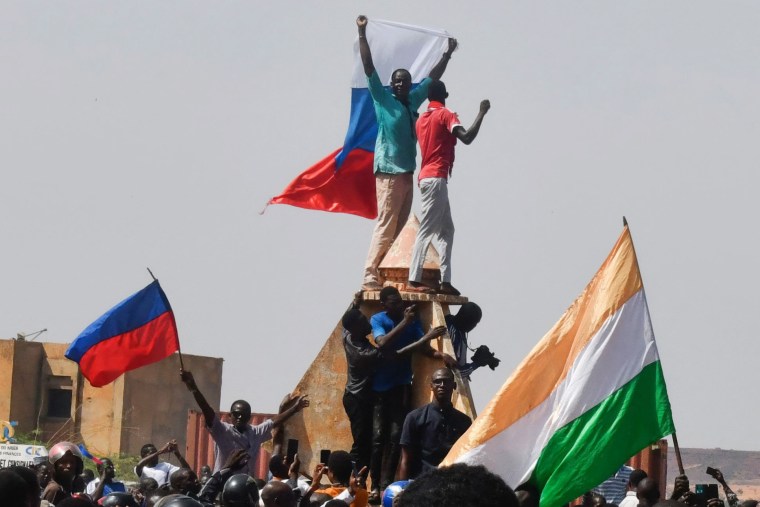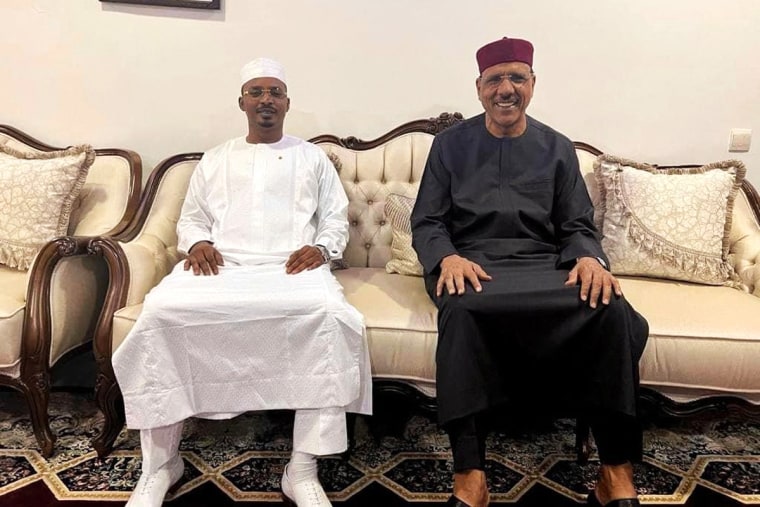NIAMEY, Niger — The United States still sees a “narrow” window of opportunity to reverse a military takeover in Niger, a senior U.S. official said on Monday, as Chad’s leader met with the country’s ousted president in a bid to resolve the crisis.
Niger’s democratically elected president, Mohamed Bazoum, who was ousted in a coup last week, was seen for the first time in photographs released on Monday.
Bazoum was photographed meeting with Chad’s leader, Mahamat Idriss Déby Itno, in Niger’s capital, Niamey, and appeared unharmed and smiling in the photos.
Déby, who flew to Niger on Sunday to try to mediate, also met the leaders of the coup and said he was trying to find “a peaceful solution.” But the military junta appeared to tighten its grip on power, arresting 130 members of the president’s party, including four officials in Bazoum’s deposed cabinet, the former ruling party said.
Although France, Germany and the European Union have called the takeover by the military officers a coup, the Biden administration so far has refrained from using the word. If American officials formally declare the events in Niger a coup, U.S. law requires the suspension of all U.S. economic and military assistance to the country.

“It’s an attempted takeover,” a senior State Department official told reporters in Washington. “We don’t think it’s fully successful, and we think there’s a narrow opportunity to reverse it.”
Secretary of State Antony Blinken said Saturday that continued American assistance — which totals roughly $400 million — would depend on the release of Bazoum and the restoration of democratic rule. But the Biden administration has not set a deadline, the senior official said.
The U.S. does not see the Russian paramilitary Wagner group or the Russian government as orchestrating the attempted takeover in Niger, the official said. However, the administration does expect Russia and the Wagner group to try to take advantage of anti-French sentiment in the region.
“I don’t think it’s a coincidence that [Wagner leader Yegevny] Prigozhin goes for former French colonies,” the official said, citing past campaigns by the group in Mali and Burkina Faso.
The U.S. does not perceive an imminent security threat to the U.S. embassy in Niamey at the moment, three U.S. officials said.
The E.U. and France have cut off all financial support to Niger and condemned the putsch.
Niger has been the anchor for a Western-backed counterterrorism campaign for years in Africa’s volatile Sahel region but the unrest in recent days threatens to derail the effort after a series of military coups in West Africa.
U.S. officials had called Niger a democratic model for the region, with roughly 1,110 U.S. troops helping build up Niger’s special forces to combat Boko Haram, Islamic State militants and al Qaeda-linked groups. France, a former colonial power that ruled the country until 1960, has about 1,500 troops on the ground conducting joint operations with Nigerian units.
But as funding and equipment bolstered Niger’s special forces, the country’s presidential guard viewed the assistance as a threat to its position, and its commander suspected he would be sidelined by the president, current and former U.S. officials and experts said.
“You had a different elite coming into being. They were getting the resources. They were getting the specialized training,” said J. Peter Pham, the former U.S. envoy to the Sahel region. The presidential guard feared it would lose its “elite status,” said Pham, now a fellow at the Atlantic Council, a Washington-based think tank.
NBC News has previously reported that the underlying issue fueling the coup appeared to be a personal dispute between the presidential guard commander — and now self-proclaimed leader of Niger, Gen. Abdourahamane Tchiani — and Bazoum.
The military junta has accused foreign governments of planning to rescue Bazoum and warned them not to intervene.
West African governments in the 15-nation Economic Community of West African States (ECOWAS) have suspended all financial transactions with Niger, frozen the country’s assets and imposed a travel ban on the army officers involved in the coup.
The bloc has also given the coup leaders one week to restore democratic rule or face possible military intervention. Regional analysts said it remained unclear if the West African states were ready to make good on their threat.


